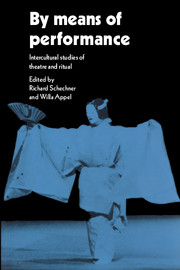Book contents
- Frontmatter
- Contents
- List of figures
- Notes on contributors
- Concerning Victor Turner
- Introduction
- 1 Are there universals of performance in myth, ritual, and drama?
- 2 Magnitudes of performance
- 3 Liminality: a synthesis of subjective and objective experience
- 4 The Yaqui deer dance at Pascua Pueblo, Arizona
- 5 A Yaqui point of view: on Yaqui ceremonies and anthropologists
- 6 Performance of precepts/precepts of performance: Hasidic celebrations of Purim in Brooklyn
- 7 The significance of performance for its audience: an analysis of three Sri Lankan rituals
- 8 What does it mean to “become the character”: power, presence, and transcendence in Asian in-body disciplines of practice
- 9 Korean shamans: role playing through trance possession
- 10 The practice of noh theatre
- 11 The profanation of the sacred in circus clown performances
- 12 Ethnographic notes on sacred and profane performance
- 13 The spatial sense of the sacred in Spanish America and the American South and its tie with performance
- 14 Space and context
- 15 The transformation of consciousness in ritual performances: some thoughts and questions
- 16 Universals of performance; or amortizing play
- Appendix
- Bibliography
- Index
5 - A Yaqui point of view: on Yaqui ceremonies and anthropologists
Published online by Cambridge University Press: 05 June 2012
- Frontmatter
- Contents
- List of figures
- Notes on contributors
- Concerning Victor Turner
- Introduction
- 1 Are there universals of performance in myth, ritual, and drama?
- 2 Magnitudes of performance
- 3 Liminality: a synthesis of subjective and objective experience
- 4 The Yaqui deer dance at Pascua Pueblo, Arizona
- 5 A Yaqui point of view: on Yaqui ceremonies and anthropologists
- 6 Performance of precepts/precepts of performance: Hasidic celebrations of Purim in Brooklyn
- 7 The significance of performance for its audience: an analysis of three Sri Lankan rituals
- 8 What does it mean to “become the character”: power, presence, and transcendence in Asian in-body disciplines of practice
- 9 Korean shamans: role playing through trance possession
- 10 The practice of noh theatre
- 11 The profanation of the sacred in circus clown performances
- 12 Ethnographic notes on sacred and profane performance
- 13 The spatial sense of the sacred in Spanish America and the American South and its tie with performance
- 14 Space and context
- 15 The transformation of consciousness in ritual performances: some thoughts and questions
- 16 Universals of performance; or amortizing play
- Appendix
- Bibliography
- Index
Summary
Participating
Anselmo Valencia: Ever since I can remember I have thought that the spectators came and in some way participated just because they were there. They made numbers, they made a crowd. I was told when I was about six or seven that, whether or not people came, non-Yaquis, that this was not for the benefit of the public only, but really for the benefit of us, with the mandas and all that. But the old maestro – you remember the old maestro? – he said that anybody that came close, even out of curiosity, believer or non-believer, was sent by a being superior to us, by somebody superior to anything else, that we don't know, that we haven't seen a picture of or anything. Without planning to think it, I know that the people who are there, they are participating in some way and that they are somehow sent there.
Now that I deer-sing – which I understand better than most Yaquis – I know that it's a call from a superior being. I know that a person that's there, whether they believe or not, gets intensely involved with the action of the deer dancer. They are not seeking healing, but I know that they are going to go away with a good feeling. Regardless of why they are there, watching it gets their minds so deeply involved in it that, whether they go there with a headache or depression or ache somewhere in the body, they forget their pain, and to me that is healing. Those are the powers of the deer dancer or the deer singer.
- Type
- Chapter
- Information
- By Means of PerformanceIntercultural Studies of Theatre and Ritual, pp. 96 - 108Publisher: Cambridge University PressPrint publication year: 1990
- 2
- Cited by



